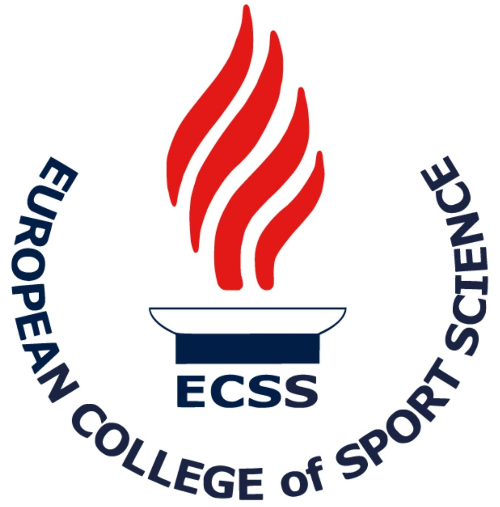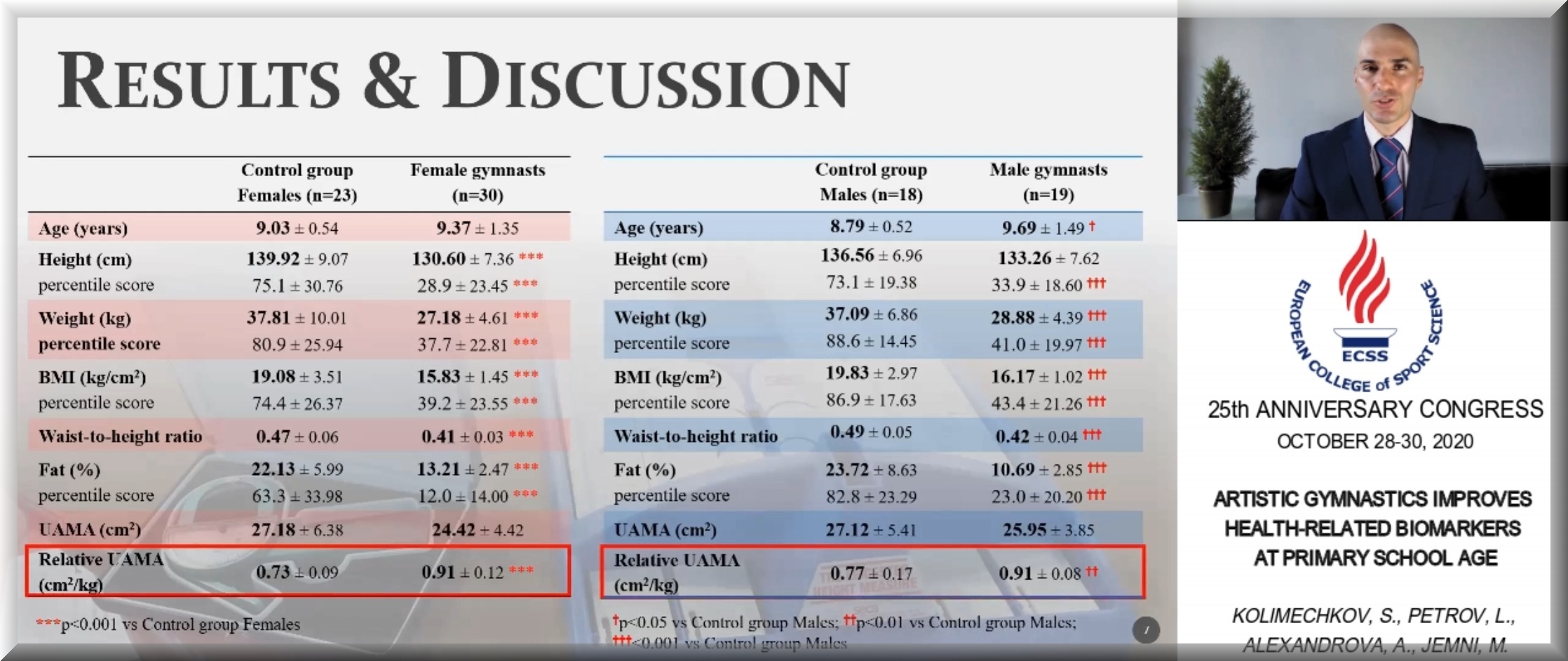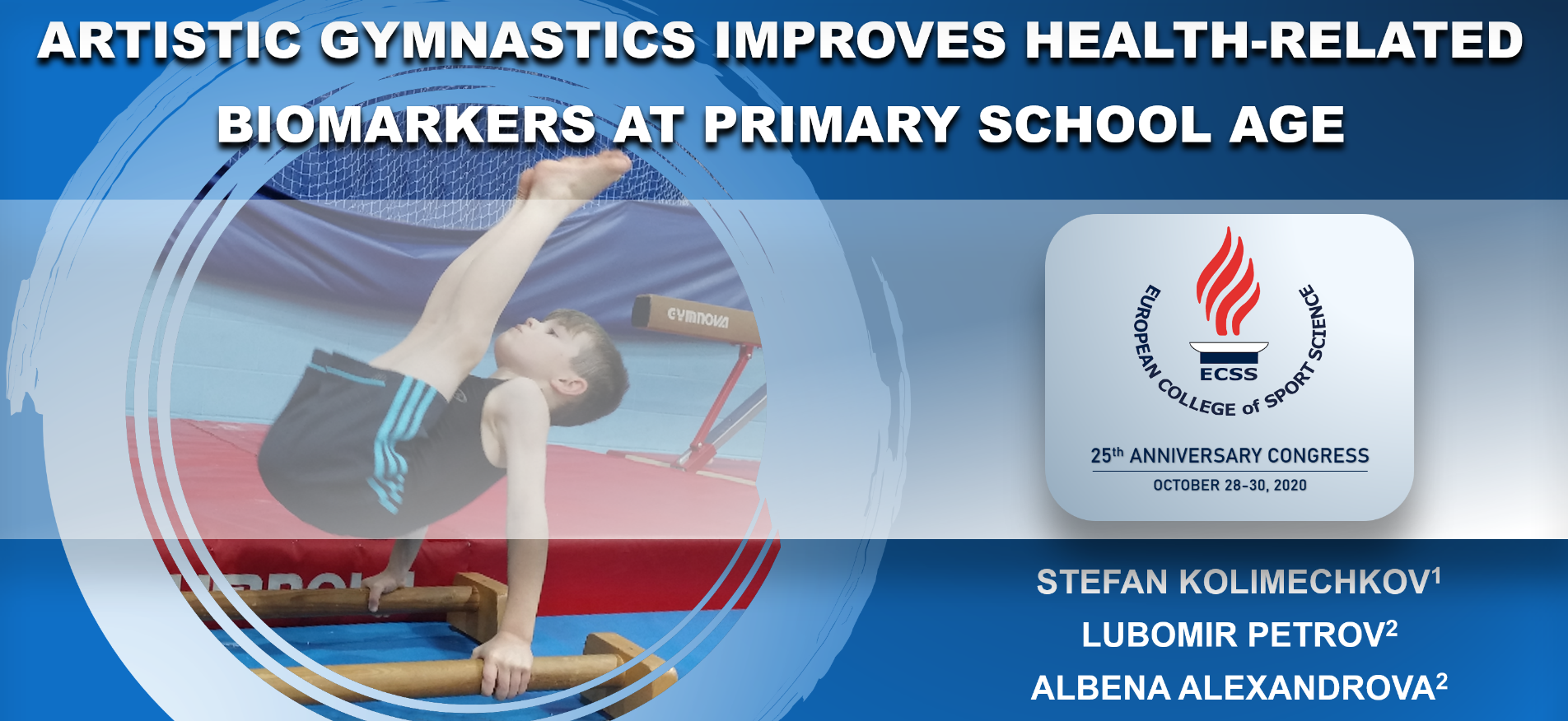ECSS Annual Congress 2020

ECSS 2020
25th Annual Congress of the European College of Sport Science (ECSS)
VIRTUAL CONFERENCE
www.ecss-congress.eu/2020
Video format: MP4 | watch on YouTube
ABOUT THE CONFERENCE
The European College of Sport Science (ECSS) is the leading association of sport scientists in Europe, and its main scientific event is the ECSS Annual Congress. The ECSS was founded in 1995, and the 1st ECSS Congress was held one year after that in Nice, France. Nowadays, the ECSS Congress is one of the most prestigious events in sport and exercise science in the world, with around 3 000 researchers participating every year. In 2019 the ECSS Congress was held in Prague and I presented our study at the parallel sessions. In 2020, the ECSS Congress was planned to be held on 1-3 July 2020 in Seville, Spain. However, the ECSS Sevilla 2020 Congress was cancelled due to the COVID-19 pandemic, and transformed to a special virtual congress. The Online ECSS Anniversary Congress was held on 28-30 October 2020, and it celebrated the 25th anniversary of the ECSS.
OUR CONTRIBUTION
At this Congress I was accepted for an oral presentation at the parallel sessions to present the main findings from my PhD study on health-related physical fitness of young artistic gymnasts from the UK. Our presentation was part of the pre-recorded Oral presentations from the official scientific programme at the Online ECSS Anniversary Congress 2020. The abstract was published in the conference proceedings book of the 25th Anniversary Congress of the ECSS, and together with our presentation are both available for download on this page. After the Congress, our study was built upon further and the complete findings were published in the International Journal of Applied Exercise Physiology, Vol.10(1), 2021.
Artistic gymnastics improves health-related biomarkers at primary school age
Pre-recorded Oral Presentation (Virtual)

ECSS Anniversary Congress 2020
25th Annual Congress of the European College of Sport Science
ARTISTIC GYMNASTICS IMPROVES HEALTH-RELATED BIOMARKERS AT PRIMARY SCHOOL AGE
Stefan Kolimechkov1, Lubomir Petrov2, Albena Alexandrova2, Monèm Jemni3
1STK Sport, United Kingdom
2National Sports Academy, Bulgaria
3University of Cambridge, United Kingdom
ABSTRACT
INTRODUCTION:
Artistic gymnastics requires the performance of a variety of technical elements on different apparatuses where gymnasts have to overcome their body mass and even multiply it by several times when tumbling and dismounting (Jemni 2018). Maintaining optimal health and a good level of physical fitness is crucial in order to successfully perform the routines. The aim of this study was to assess health-related biomarkers to physical fitness in young gymnasts whilst estimating the benefits of regular gymnastics practice at primary school ages.
METHODS:
The study included 49 children (mean age of 9.5 years) who were practising artistic gymnastics for at least 2 years with an average of 6 hours per week, and a control group of 41 children (mean age of 8.9 years). The participants completed the Alpha-Fit physical fitness test battery (BMI, %BF, handgrip strength, standing long jump, 4x10m shuttle run test and 20m multistage fitness test). Body fat percent (%BF) was assessed by the Tanita BF-689, and VO2max was estimated from the 20m shuttle test by applying the BeepShuttle Junior software (Kolimechkov 2018) using Leger’s equations for children. Percentile scores for the results from the different tests were calculated.
RESULTS:
The scores of the main anthropometric variables, including height, body mass, BMI, and %BF in the male and female gymnasts were significantly lower than those of the control groups (p<0.001, with very large effect size d>1.20). All gymnasts had their body fat within the norms. There were no significant differences between the handgrip strength of the gymnasts and the control group for both genders. However, when reported to the relative arms area, gymnasts showed significantly higher relative upper arm muscle area and relative handgrip strength in comparison to the control groups (0.58 kg/kg body mass vs 0.42 kg/kg body mass in boys, p<0.001, d=2.00, and 0.52 kg/kg body mass vs 0.45 kg/kg body mass in girls, p<0.01, d=0.78, respectively). The results from the standing long jump test, 4x10m shuttle run test, as well as the 20m shuttle run test, were significantly greater in favour of the gymnasts in comparison to the control groups for both genders (p<0.001, d>1.20).
CONCLUSION:
These findings show that gymnastics training in childhood, contributes to maintaining a normal mass, and thereby sustaining a normal health status. Practising artistic gymnastics has a positive impact on the health-related biomarkers of children’s physical fitness.
References:
Jemni M. (2018) The Science of Gymnastics - Advanced Concepts, 2nd Edition. Routledge, Taylor & Francis Grp. London and New York. ISBN: eBook 9781315203805, Paperback 9781138701939; https://www.routledge.com/The-Science-of-Gymnastics-Advanced-Concepts/Jemni/p/book/9781138701939
Kolimechkov, S., Petrov, L., Alexandrova, A., & Cholakov, K. (2018). BeepShuttle Junior: Software for the Administration of the 20m Shuttle Run Test in Children and Adolescents. Journal of Advanced Sport Technology, 1(3), 35-40.
Presenting Author: Dr Stefan Kolimechkov
Date & time: 30 October 2020, 11:00 am
Pre-recorded Oral Presentations, Virtual
Session-ID: OP-AP15
Abstract-ID: 14
How to cite this study:
After the 25th ECSS Anniversary Congress, our study was built upon further and the complete findings were published in the International Journal of Applied Exercise Physiology, Vol.10(1), 2021, so you can cite the article in this journal as follows:
Kolimechkov, S., Petrov, L., & Alexandrova, A. (2021). Artistic Gymnastics Improves Biomarkers Related to Physical Fitness and Health at Primary School Age. International Journal of Applied Exercise Physiology, 10(1), 115-128.

